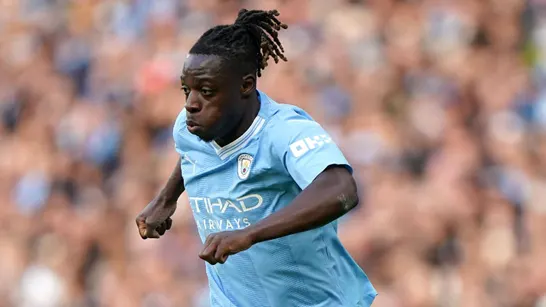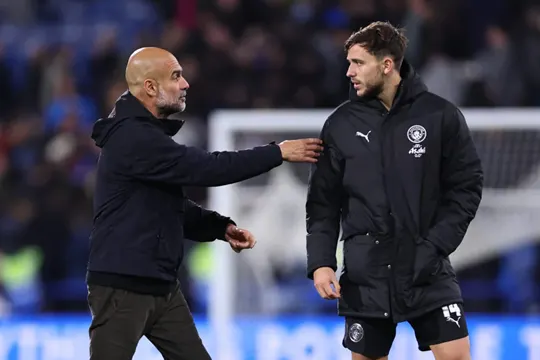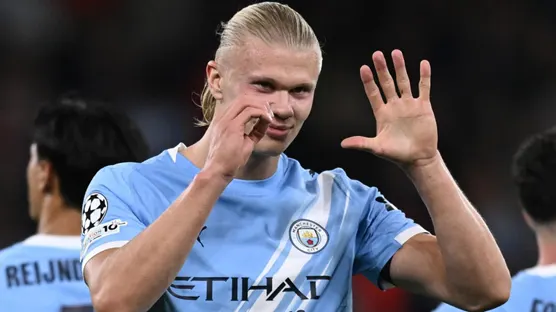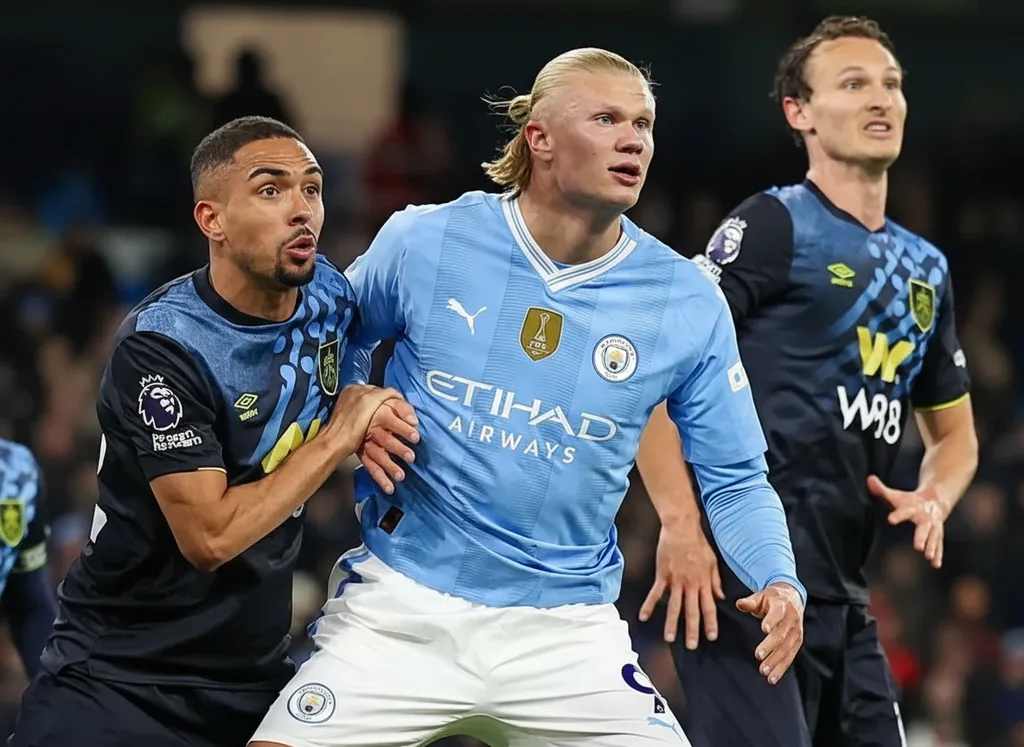There’s something deeply satisfying about watching a football team rediscover its identity after weeks of existential crisis. Manchester City’s 5-1 dismantling of Burnley wasn’t just about the goals or the three points, though both were desperately needed. It was about a side remembering who they are, what they’re capable of, and why they’ve strong-armed English football for the better part of a decade. The scoreline flattered City somewhat, but beneath the surface of this comprehensive victory lay several fascinating truths about Pep Guardiola’s evolving squad.
Jeremy Doku Has Finally Arrived
Let’s address the elephant in the room first: Jeremy Doku is no longer just a promising talent with electric pace and questionable end product. The Belgian winger has evolved into something genuinely special, and Saturday’s performance against Burnley provided the latest evidence of his remarkable development.
Doku now has three assists in his last three Premier League games, more than he managed in his previous seventeen appearances combined. That statistic alone tells you everything about his transformation from raw talent to genuine match-winner. But numbers only scratch the surface of what makes him so compelling to watch.

What separates Doku from other quick wingers is his relentless determination to take on opponents and his refusal to play it safe when the direct option presents itself. In an era where football has become increasingly risk-averse and system-dependent, Doku represents something refreshingly anarchic. This player trusts his instincts and backs himself to beat defenders one-on-one.
Guardiola’s recent comments about Doku’s improved decision-making hit the nail on the head. The manager has helped the Belgian find focus and tactical discipline without neutering his instincts. Against low-block defences, precisely the kind Burnley deployed for an hour, Doku’s ability to create something from nothing becomes invaluable.
He’s the best natural dribbler in world football right now, even if he’s not yet the complete winger or forward. But here’s the crucial development: Doku is learning to create for teammates, not just himself. His assist for Haaland’s first goal showcased vision and execution that would have been beyond him six months ago. He’s evolving before our eyes, and City are reaping the rewards.
Nico Gonzalez: The Quiet Maturation
While Doku grabbed the headlines and the standing ovation, Nico Gonzalez’s steady performance offered a different kind of encouragement for Guardiola. The young midfielder arrived with a hefty price tag and the weight of expectation, but he’s showing the kind of maturity that suggests he’ll grow into the role City need him to fill.
Gonzalez plays with caution that frustrates some observers, but there’s intelligence in his conservatism. His positioning is excellent, his interceptions timely, and his ability to read danger developing speaks to a footballer who understands the game at a deeper level. Yes, his passing lacks the creative spark of a Kevin De Bruyne or the progressive thrust of a Rodri, but that’s an unfair comparison for a player still adapting to the Premier League’s relentless demands.

The modern Premier League has become an absolute beast, the physicality, the pressing intensity, the tactical sophistication required to survive, let alone thrive. Gonzalez is finding his feet in this environment, and there’s every reason to believe he’ll become more expressive as his confidence grows and his fitness levels peak.
He’s not the finished article, but he doesn’t need to be. What matters is the trajectory, and right now it’s pointing upward.
Transitions Are Never Smooth- Accept It
The first-half performance against Burnley wasn’t pretty. City looked disjointed at times, struggled to break down a well-organised defence, and conceded a sloppy equaliser that had fans muttering about familiar defensive fragilities. Some supporters voiced frustration, questioning why the team couldn’t simply flip a switch and dominate from the opening whistle.
But here’s the uncomfortable truth about transitions: progress is rarely linear, and patience is the price of evolution. Guardiola is integrating new players, experimenting with tactical adjustments, and managing without Rodri, arguably his most important midfielder. These things take time to coalesce into something coherent.
Despite the scrappy first half, City found a way to win convincingly. That’s not insignificant. Great teams don’t always play great football; sometimes they grind through difficult periods and emerge with three points anyway. The ability to win ugly is often more valuable than the ability to win beautifully.
Arsenal and Liverpool are experiencing their own bumps in the road this season, proof that even the best sides face adversity during periods of change. The key is navigating these challenges without losing sight of the bigger picture.
The Squad Is Still Finding Its Identity
Perhaps the most important lesson from Saturday’s victory is understanding that this Manchester City squad remains very much a work in progress. More players are returning from injury, new signings are settling into their roles, and tactical ideas are still being refined on the training ground.
This isn’t the final form of Guardiola’s team- not even close. What we’re witnessing is the early stages of evolution, where raw talent and established quality are slowly melding into something cohesive. The potential is obvious: there’s significant talent throughout this squad, from established stars like Haaland and Bernardo Silva to emerging players like Doku and Gonzalez.
As players continue adapting and improving, new tactical possibilities will emerge. Chemistry takes time to develop, patterns of play require repetition to become instinctive, and trust between teammates isn’t manufactured overnight. City is building toward something, but they’re not there yet.
The excitement lies in recognising how much room for improvement still exists. If this version of City can dismantle teams 5-1 while still finding their rhythm, imagine what they’ll be capable of when everything clicks into place.
Haaland Remains the Premier League’s Ultimate Predator
If there’s one constant amid all this transition and evolution, it’s Erling Haaland’s ridiculous goal-scoring ability. The Norwegian now has eighteen goals and assists in his last nine competitive games, a statistic so absurd it barely seems real.
What makes Haaland truly special isn’t just his finishing, though that’s obviously world-class. It’s his instincts, his predatory positioning, his ability to capitalise on the slightest defensive mistake. He moves like an apex predator stalking prey- relentless, focused, utterly ruthless when opportunities present themselves.
His physical attributes are extraordinary: the pace, the power, the aerial dominance. But it’s the mental side that sets him apart, the way he senses where the ball will drop, how he anticipates defensive errors before they happen, his refusal to stop hunting even when nothing is working.

Against Burnley, his two late goals felt inevitable rather than fortunate. That’s the mark of an elite striker: the sense that scoring is simply what he does, as natural as breathing. Right now, Haaland is unmatched in the Premier League, and perhaps in world football. City’s success this season will ultimately be measured by how effectively they get him the ball in dangerous positions.
The Road Ahead
Manchester City’s demolition of Burnley provided more questions than answers, but sometimes that’s exactly what you want from a victory. This is a team in transition, finding its identity while navigating injuries and integrating new talent. The raw materials are exceptional, the coaching is world-class, and the ambition remains as fierce as ever.
The journey won’t be smooth, transitions never are, but if Saturday proved anything, it’s that City possess the quality to win even while they’re still figuring things out. And when they finally hit their stride? The rest of the Premier League should be very, very worried.


